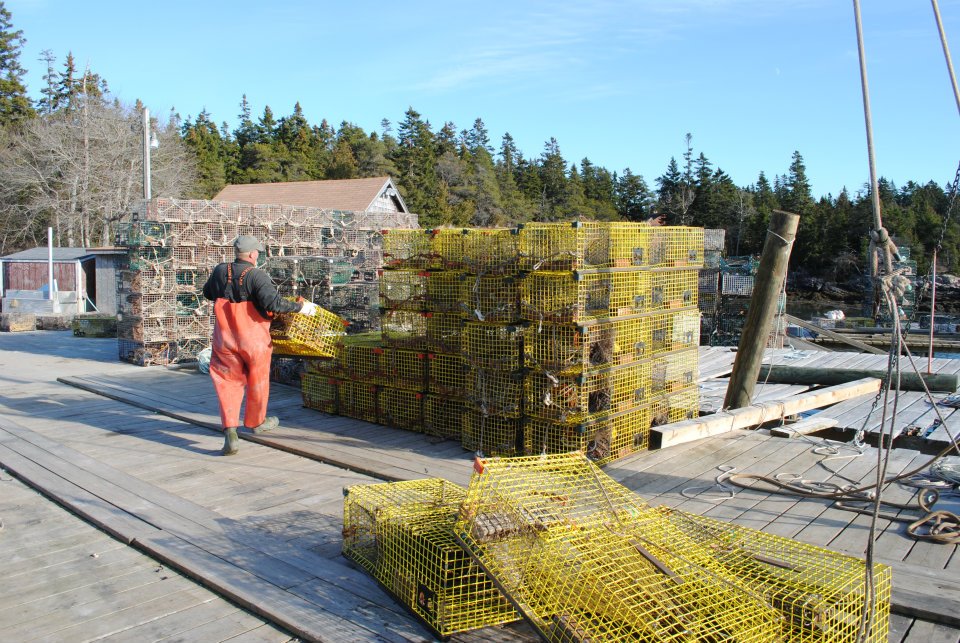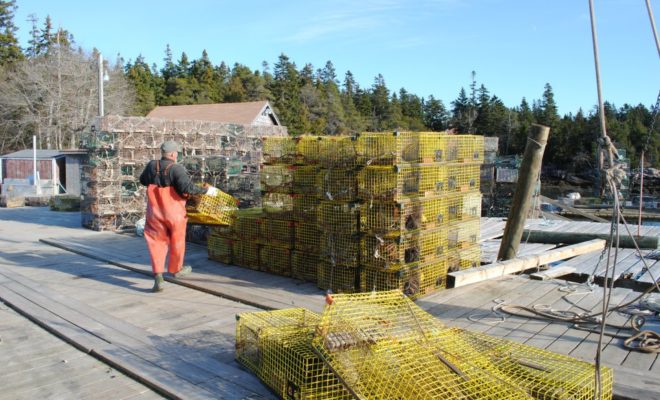Bunkers Harbor, just on the western side of Prospect Harbor, is a small place, the kind of remote fishing outpost that much of the coast of Maine is known for. There are a few old wharves clustered around the small inlet of water that constitutes the harbor proper. The narrow opening is surrounded on both sides by rocky shores and tall, majestic spruce trees. Old and weathered houses cling to the shoreline, seemingly hanging right over the water. American flags wave proudly, and brightly colored pickup trucks sit parked in gravel-filled lots. The local lobster pounds here are operated out of the backyards of their owners’ houses.
There are only a couple of fishing shacks in town, and most are filled with all the requisite must-have items of fishing gear: striped buoys, numerous scales, and cans of diesel fuel. Frayed rope and rusted traps cover the grass leading up to doorways. At one particular pound during a recent visit of mine, a creaky wooden ramp led down to the water’s edge, where makeshift plastic floats served as an anchor for the main dock, which had to be some twenty feet in length. A big fishing boat, Gerry Anne, pulled up to the dock, ready to unload her catch for the day.
The boat’s diesel engine cooled down as her crew immediately began to go about their end of the day routines. A tall and lanky man sporting a large beard grabbed the hose and began to wash down the gunnels and the deck of the boat. He moved with weary precision. He looked tired, but seemed determined to do whatever he needed to do to get off the boat.
Another man, much shorter in stature, started to scrub down the steering wheel and the main cabin. He then scrubbed himself down, along with the other men on the boat. The captain, an older man who looked to be in his 70’s, calmly stepped off the boat and began to discuss the logistics of the day with the manager of the pound. He relayed important pieces of information to the manger, including the amount of bait that was used and the amount of fuel that was needed for the next day. After their discussion, the manager began to inspect the lobsters, weighing them and sorting them into two separate groups: one that would go to market and one that would stay preserved in the many lobster “cars,” that floated around the dock.
After the work had been finished, and the cleaning was complete, the captain backed his boat out into the harbor and made room for another boat, Last Chance, to come in and do the same thing. The temperature hovered around thirty-five degrees, and the sun was beginning its descent in the sky. The day had started out with warmer air, but now had turned downright cold.
The men lingered on the dock for a few minutes, shooting the breeze and complaining about how little they had caught. “Just hasn’t been the same as last year,” one of the men remarked, as he spit his black-colored chew into the water. “Just ain’t been the same.” The men then collectively walked up the wooden planks of the dock and out into the gravel parking lot, where their pickups awaited them. Engines roared, tires spun, and gravel flew.
The men were gone, but not for long. Even as winter continues her fast approach and the stormy seas off the Schoodic Peninsula refuse to lessen their icy grip, the lobstermen of downeast Maine continue to work. It is as it has always been in these parts.


